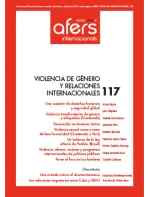Gender Violence and International Relations

Violence against women is an issue of human rights and global security. According to the WHO, one in three women worldwide suffers from gender-based violence. Issue 117 of Revista CIDOB d’Afers Internacionals investigates the international roots, responses and patterns of violence against women, especially in Latin America. The papers examine, on the one hand, how the violence is shaped by international conflicts, by international political economy patterns and related social changes; on the other, the role of women’s organisations and feminist movement, and the response of states and international organisations through new legal models and public policies. The authors use a wide range of methodologies, which include ethnography, quantitative analysis, jurisprudence, public policy analysis and comparative case studies.
DOI: doi.org/10.24241/rcai.2017.117.3